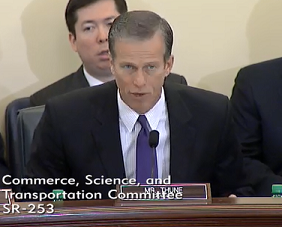Wheeler: We'll Take Special Efforts to Help Displaced LPTVs
The smarter way to stay on top of the multichannel video marketplace. Sign up below.
You are now subscribed
Your newsletter sign-up was successful

The fate of TV stations, including low-power TVs, in and after the FCC's incentive auction has been a high-profile issue in Washington as broadcasters seek FCC or court help. That continued in a Senate Commerce Committee FCC oversight hearing Wednesday, where FCC chairman Tom Wheeler said the FCC would make "special efforts" to accommodate any LPTVs displaced in the repack and would not be putting urban stations, whose spectrum is of more value, at the front of the line in the repack.
Commerce Chairman Sen. John Thune (R-S.D.) signaled the auction would be a topic of hot conversation from the outset.
Pointing out the incentive auction would be starting soon (March 29 is the official kickoff, with the actual auction starting a couple of weeks after that), Thune said in his opening statement that the FCC was charged with a "balanced" mission: Auctioning spectrum voluntarily given up by broadcasters to wireless users, and protecting the TV stations that remain as well as their viewers.
He said he had heard the concerns that the $1.75 billion relocation fund and 39-month timeline might not be sufficient.
The National Association of Broadcasters has been making that point loudly. He said he hoped that would not be the case, but said the concerns would receive "the close attention of the committee."
Later in the hearing, Wheeler was asked by Sen. Jerry Moran (R-Kan.) whether urban stations, where spectrum is most needed, would get priority in the repack with rural stations at the end of the line for money. "I want to make certain that rural is not at the end of the line when it comes to reimbursement or when it comes to trying to find a contractor to build a tower.
Wheeler said the FCC would have to look at the repack as a whole and that moves in Chicago could affect what happens in Kansas. "They are all interconnected, which means there is not one higher ranking spectrum than other," he said. "If you haven’t got it right in one area it daisy chains and screws up Chicago."
The smarter way to stay on top of the multichannel video marketplace. Sign up below.
Sen. Deb Fischer (R-Neb.) was among the most vocal senators on the issue of preserving LPTVs post-auction.
"I am concerned about what will happen to low power television stations in Nebraska after the incentive auction." She pointed out that Nebraska has less than two million people, with many in rural areas that rely on LPTVs to get local content, rather than having to receive it from full powers in Iowa or South Dakota.
Fisher said that Wheeler had consistently declined to say whether LPTVs would be able to keep their spectrum--they are not protected in the repack. She asked if he could at least assure her every reasonable effort would be made to find a channel so they don't have to go off the air given they are providing a "Very worthwhile and valuable service."
"Yes, mam," said Wheeler, explaining that Congress did not establish any priority for LPTVs. He said the FCC won't know what the spectrum layout will look like afterwards. He said the the FCC has said that "heaven forbid there is a situation"--presumably being an LPTV's channel is needed to repack a full power, or perhaps even be freed up for unlicensed--the commission will help them find a new channel, or share a channel, including with a Class A LPTV, which would give them more "oomph."
"So, yes, we have laid out a plan to do that as soon as we know what the landscape looks like."
Sen. Steve Danes (R-Mont.) also pressed the chairman on LPTV protection. He said Wheeler had clearly prioritized unlicensed spectrum in the auction--the FCC has proposed reserving a vacant channel where one is available after the repack for unlicensed use, but since LPTVs aren’t protected, that could mean unlicensed would get priority over them.
He said LPTVs being able to stay on the air was a big deal back home and asked Wheeler what assurances he could give to those small businesses that may be forced off the air and the communities who rely on those stations, and translators, for programing, including the [Super Bowl Champion) Denver Broncos.
Wheeler repeated that he did not know what the auction would produce but said he thought the impact on Montana would be different, which he called a "saving grace."
He said the FCC will make "special efforts" to find new channels, and share. "We have heard you loud and clear and I know it is a matter of angst." Danes said "angst" was a good word, but that "scared to death" also described it.
Contributing editor John Eggerton has been an editor and/or writer on media regulation, legislation and policy for over four decades, including covering the FCC, FTC, Congress, the major media trade associations, and the federal courts. In addition to Multichannel News and Broadcasting + Cable, his work has appeared in Radio World, TV Technology, TV Fax, This Week in Consumer Electronics, Variety and the Encyclopedia Britannica.

